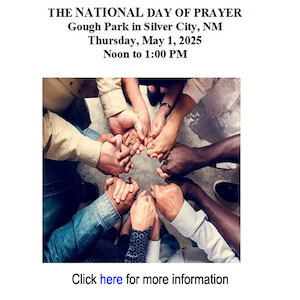At noon, Wednesday, January 22, Jeff Parker, owner of Explore in Focus, presents the role that nature photography has played in promoting and even stimulation conservation. The Lunch and Learn event of the Western Institute of Lifelong Learning (WILL) is part of free public programs by WILL and the Silver City Museum in the ABC room of the Global Resource Center, Kentucky and 12th Streets.
Parker, a voracious reader from age 6, first encountered nature in reading about his then favorite animals—dinosaurs. He spent a lot of summer time with his grandparents in Texas state parks. "I would feed all of the critters," he recalls. "I would stay stock still watching wildlife for hours."
Photography came later at age 12, though he had to wait to buy the necessary equipment. He's grateful that digital photography has made the avocation more accessible.
"Probably the number one issue with folks starting out is [lack of fast] shutter speed. If the camera is set on Auto and there's not a lot of light, the shutter speed is probably going to be too slow. It helps to learn about exposure and how the controls work together to get results that you desire."
This spring Parker's firm, teaching nature photography, offers sold out journeys to capture (figuratively) birds in Colombia, wildlife in Costa Rica, and spring in Yellowstone. There's still room to enroll to scout out snow leopards where snow leopards apparently hang out – Mongolia. And finally, the winter pumas in Patagonia also await budding Avedons au naturel.
Parker admits that he doesn't do much photography when he's at home. "In Texas," he recalls, "we had a lot of butterflies, birds, flowers, insects and frogs on our property." At his current New Mexico residence, next to public land, hunters have made "big, beautiful mammals" camera shy.
There are pristine New Mexico sites for nature photography, however. "A premier wildlife destination in New Mexico is Bosque del Apache National Wildlife Refuge south of Socorro. Anyone who has an interest in nature should visit between Thanksgiving and early January. The snow geese and cranes are spectacular."
Parker's presentation is the second WILL Lunch and Learn for 2025. On January 29 Rachel Burke will describe her work with Grant County citizen scientists to help preserve nectar-feeding bats.











